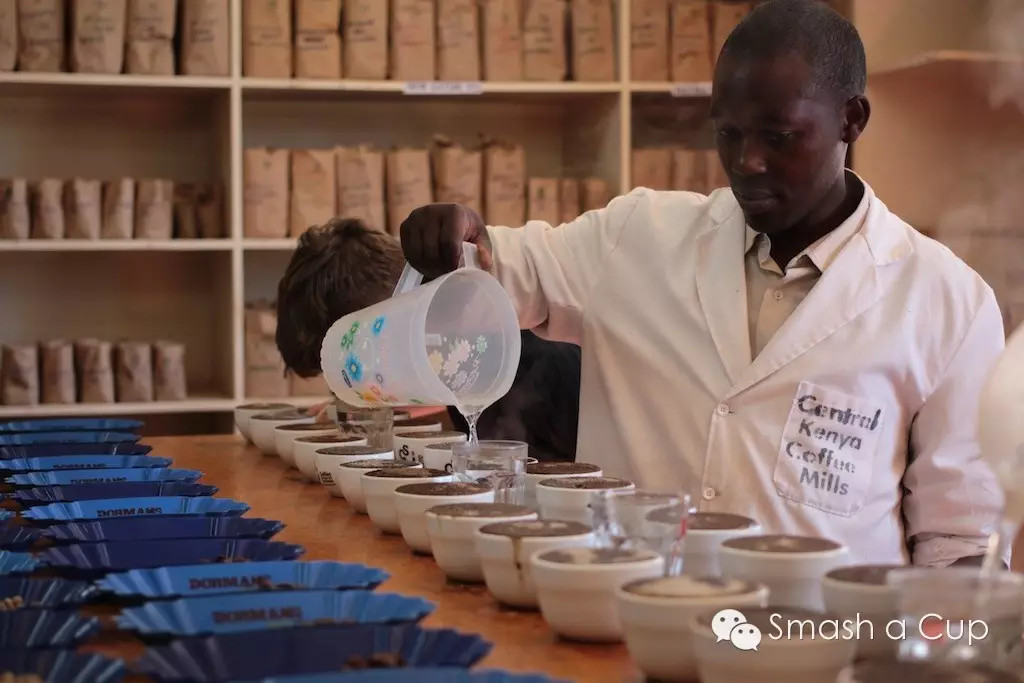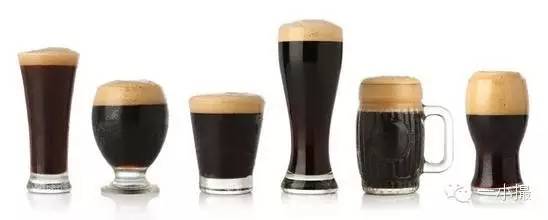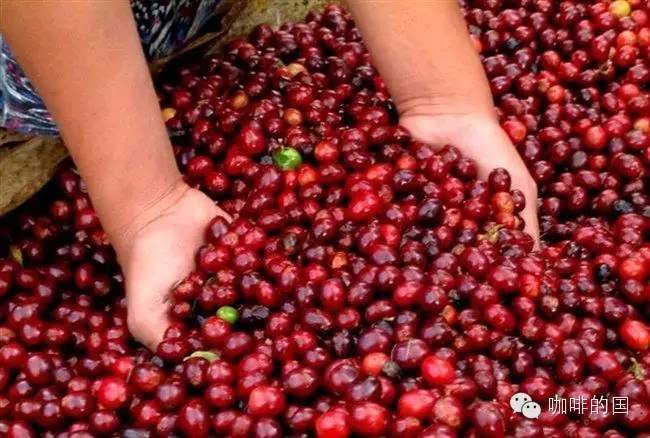Value chain Analysis of Kenyan Coffee Fine African Coffee beans
In the processing stage of coffee beans in the upper reaches of the industry, auction and marketization are the two most important issues. There are only five mills in Kenya, and KPCU manages the largest one and controls about 70% of its production revenue. For the auction phase, until 2002, the Kenya Coffee Commission (Coffee Board of Kenya) was the only auction agent. After a round of reforms in 2002, it changed its role and became an institution with the right to issue agency licenses to applied auction agents. As a result, KPCU has been granted an agency license, and its rights have been further expanded. Recently, about 20 marketing agents have applied to participate in weekly auctions. Since coffee beans from small farms are processed separately, they are easily mixed with lower quality coffee beans from other farms and sold to exporters during grinding. this reduces the enthusiasm of small-scale farmers to produce high-quality coffee beans because they are paid according to the level of income generated by the number of coffee beans they produce. Not based on the quality of the coffee beans they produce.
4. Upgrading the value chain
According to the value added table below, the whole value chain has the greatest room for appreciation in the stages of processing, auction and baking, but this is mainly for the leading enterprises rather than individual farmers.
(* 1 kg of roasted coffee = 1.19 kg green coffee)
Therefore, to upgrade the value chain of the coffee industry, the following points are key:
1) small-scale farmers or workshops vigorously promote upgrading and renewal in production and processing.
Due to the lower production efficiency, small-scale farmers or workshops will produce much less than medium-and large-scale ones, which is due to the lack of production capital and the backwardness of production technology. The US Agency for International Development (USAID) estimates that a 50 per cent increase in productivity would increase farmers' profits from commodity exports by 58 to 70 per cent. Therefore, the upgrading of agricultural equipment and technology, especially the production equipment that some workshops themselves can afford, is a top priority for small-scale workshops in Kenya.
2) carry out system reform to expand the number of merchants participating in auction / marketization.
Kenya still has no leniency in the rules and regulations related to coffee processing, auction and marketization, and the Kenya Coffee Commission is still the only agency authorizing the issuance of licenses to mills and agents. Today, the rules and regulations laid down by the committee must be re-examined to allow more economically dynamic private businesses to enter the coffee value chain. The most important thing is to make more large companies with licenses more directly involved in this part of the consumer market. Self-employed farmers should also have the right to directly enter the consumer market to carry out legitimate business activities.
3) in the baking stage, increase stimulating preferential policies to expand domestic demand and vigorously promote local brands
In the value chain value-added table, we can find that in the auction phase, the price of roasted coffee beans is six times that of unprocessed coffee beans, and almost 50 times that of farmers. Farmers can grasp this stimulus and strategically find partners to reduce the price gap between the cost price and the retail price in the domestic market, which can be achieved through joint ventures to invest in promoting local bakery and local brands. In order to enable it to bring benefits to farmers, zhengfu needs to play an important role in the establishment and mediation of these rules and regulations. At the same time, zhengfu should also strive to enhance the competitiveness of the Kenyan coffee market, use financial incentives to encourage more foreign businessmen to participate in the local coffee market, and carry out benign cooperation with local farmers. In addition, it is also necessary to promote Kenyan coffee drinking habits in order to strengthen the domestic market.
5. Summary
Kenya's coffee industry plays an important role in today's world economic system. However, most of the production value is still generated in the auction / marketization stage, and large profits are controlled by some large leading companies, state power (CBK) and coffee roasting and retail mechanisms in developed countries. It is very difficult for local farmers, especially small-scale farmers, to profit from the coffee industry. Therefore, it is of international strategic significance for Kenya to update and upgrade the coffee value chain, especially in the processing, marketization and roasting stages to enhance the global competitiveness of the Kenyan coffee industry.
The original text is written in English | Wang Xiaozhi
Exclusive compilation of SMASH A CUP | Elvan
A brief introduction to the author
Wang Xiaozhi, graduated from the School of International Relations, Peking University, and majored in International Development practice, School of International Relations and Public Affairs, Columbia University. Long-term attention has been paid to such issues as Chinese investment in Africa, agricultural cooperation between China and Africa, and community agricultural development in Africa. He has been stationed in Kenya in the past year and traveled to Uganda, Tanzania, Mauritius and other countries to participate in and observe the survival and development of local international organizations, Chinese enterprises and civil society.

Important Notice :
前街咖啡 FrontStreet Coffee has moved to new addredd:
FrontStreet Coffee Address: 315,Donghua East Road,GuangZhou
Tel:020 38364473
- Prev

Coke + coffee beans? Coffee processing method: analysis of coffee beans treated with Hawaii-cola
Hawaii State is the only archipelago state in the United States, consisting of 132 islands in the central Pacific Ocean. The capital is located in Honolulu on Oahu. Kona coffee from Hawaii Kona coffee beans made in Hawaii have the most perfect appearance, their fruit is extremely full and bright, and they are the most beautiful coffee beans in the world. Coffee is smooth and fragrant, with
- Next

The trade pattern of raw coffee beans is changing, with both challenges and opportunities.
Coffee is our beloved, and global coffee consumption has nearly doubled in the past 40 years, with an average of 2.25 billion cups of coffee consumed every day, of which about 400 million cups are consumed in the United States alone. But do you know where coffee comes from, how it is made, and how it becomes a delicacy in our cups? In order to change the mass consumer
Related
- Can I make coffee a second time in an Italian hand-brewed mocha pot? Why can't coffee be brewed several times like tea leaves?
- Hand-brewed coffee flows with a knife and a tornado. How to brew it? What is the proportion of grinding water and water temperature divided into?
- What is the difference between Indonesian Sumatra Mantinin coffee and gold Mantinin? How to distinguish between real and fake golden Mantelin coffee?
- What does bypass mean in coffee? Why can hand-brewed coffee and water make it better?
- Unexpected! Ruixing Telunsu lattes use a smoothie machine to foam milk?!
- % Arabia's first store in Henan opens into the village?! Netizen: Thought it was P's
- Does an authentic standard mocha coffee recipe use chocolate sauce or powder? Mocha Latte/Dirty Coffee/Salty Mocha Coffee Recipe Share!
- What is the difference between Vietnam egg coffee and Norway egg coffee? Hand-brewed single product coffee filter paper filter cloth filter flat solution!
- What is the difference between sun-cured and honey-treated coffee? What are the differences in the flavor characteristics of sun-honey coffee?
- How to make Italian latte! How much milk does a standard latte use/what should the ratio of coffee to milk be?

